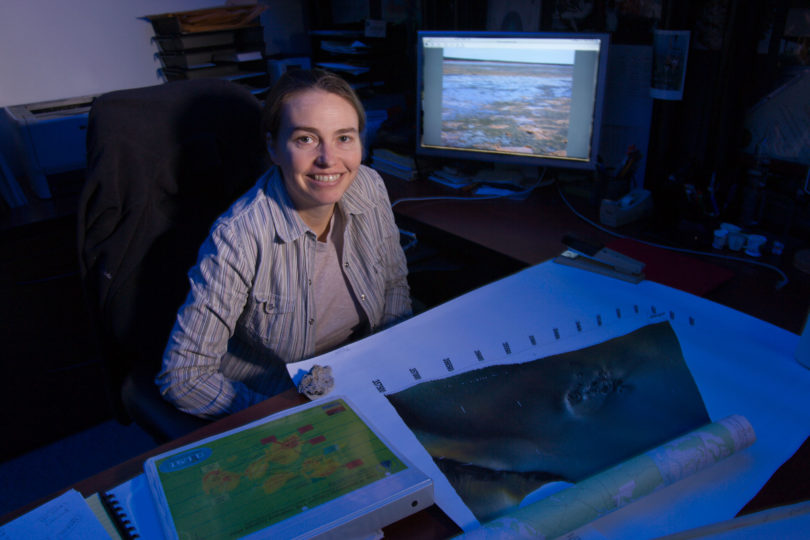UGA marine scientist Samantha Joye, Athletic Association Professor in Arts and Sciences, and UGA colleagues Patricia Medeiros and Christof Meile have received a $1.3 million grant from the Gulf of Mexico Research Initiative that will enable UGA researchers and scientists from 13 other institutions to understand more thoroughly the ecosystem impacts of the 2010 Deepwater Horizon oil spill.
The three-year grant, awarded through a competitive merit-review process by a board comprised of researchers from academic institutions, will allow scientists and emergency responders to better predict and respond to future spills, should they occur.
“This research program will provide a comprehensive assessment of the water column and benthic impacts of the Deepwater Horizon oil spill and also will allow us to begin to document the trajectory of ecosystem recovery,” Joye said.
Joye will serve as the associate science director for the project, “Ecosystem Impacts of Oil and Gas Inputs to the Gulf” or ECOGIG. Raymond Highsmith, executive director of the University of Mississippi’s National Institute for Undersea Science and Technology, is the lead investigator.
At areas known as hydrocarbon seeps, Joye said, oil and gasses naturally ooze and bubble from the floor of the Gulf of Mexico into the water in quantities that, at most, are 3 percent of the amount discharged during the Deepwater Horizon blowout. The researchers will compare food webs, carbon cycling and other ecosystem processes at these naturally occurring seeps with areas impacted by the blowout. The team also will compare its findings with previous data on sites in the Gulf that are not impacted by either the seeps or the blowout. Technologies such as remote cameras, unmanned vehicles and satellite remote sensing will provide long-term, continuous data.
Specific objectives of the project include:
• Comparing the effects of biological and physical processes with the effects of dispersant applications on the transfer of oil between surface waters, deep water and sediments;
• Defining how sedimented oil impacts microbes and invertebrates (such as clams and tubeworms) on the seafloor and in the water column;
• Monitoring for signs of recovery in ecosystems impacted by the blowout; and
• Developing tools and techniques to track hydrocarbons as they are biologically processed by microbes and other organisms.
“After the 2010 oil spill, it became very clear that we needed to improve our understanding of the biogeochemical processes taking place in the Gulf,” said Medeiros, an assistant professor of marine sciences in UGA’s Franklin College of Arts and Sciences. “This is a great opportunity for a large group of scientists with diverse research backgrounds to work together to investigate those complex processes.”
The GRI Research Board is an independent body established by the Consortium of Ocean Leadership, a nonprofit organization that aims to advance education, research and sound ocean policy. The University of Mississippi-led team is one of eight consortia announced on Aug. 31, 2011, that will receive a total of $112.5 million over three years.
In addition to Highsmith, Joye and Medeiros, other ECOGIG executive committee members are Christopher Martens and Andreas Teske, University of North Carolina at Chapel Hill; Annalisa Bracco and Joseph Montoya, Georgia Institute of Technology; Chuck Fischer, Pennsylvania State University; Ajit Subramanium, Columbia Lamont-Doherty Earth Observatory; and Uta Passow, University of California, Santa Barbara.
Additional participating ECOGIG institutions are the University of Southern Mississippi; Florida State University; Temple University; Oregon State University; University of Maryland; the University of Texas, Austin; and the J. Craig Venter Institute.








